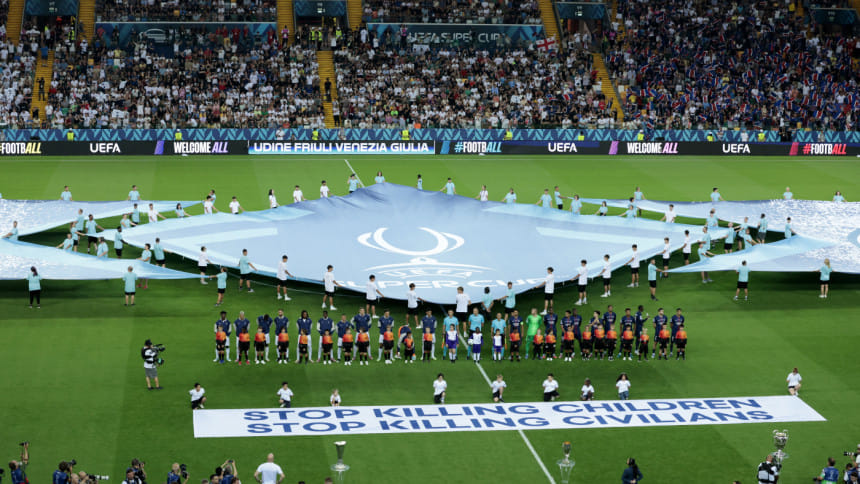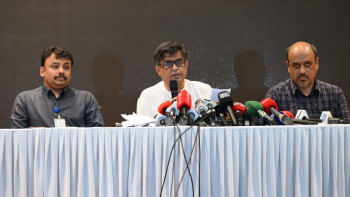UEFA breaks silence on Gaza crisis with symbolic gesture

In an unprecedented move, UEFA directly addressed the humanitarian crisis in Gaza during a high-profile match, breaking from its long-standing policy of avoiding politically sensitive statements in football arenas.
Before Wednesday's UEFA Super Cup between PSG and Tottenham Hotspur at the Stadio Friuli in Udine, Italy, a banner reading ''Stop killing children – Stop killing civilians'' was displayed prominently on the pitch as players lined up. In another symbolic gesture, two refugee children from Gaza took part in the medal presentation ceremony after the match.
The display marked a significant departure from UEFA's traditionally apolitical stance. While the European governing body has consistently promoted "no discrimination" campaigns and responded to general humanitarian concerns, it has generally refrained from making statements that could be interpreted as taking sides in conflicts with political dimensions.
According to UEFA's own regulations, political, ideological, and religious messages are prohibited inside stadiums before, during, or after matches, with violations potentially leading to fines and other disciplinary measures. The message in Udine, however, directly addressed the ongoing violence in Gaza, making it one of the rare occasions UEFA has stepped into a politically charged humanitarian debate.
The governing body's intervention comes amid heightened scrutiny following its tribute to former Palestinian footballer Suleiman al-Obeid. On Saturday, Liverpool and Egypt forward Mohamed Salah criticised UEFA for omitting the circumstances of Obeid's death in its public statement.
UEFA had posted a message on social media platform X reading: "Farewell to Suleiman al-Obeid, the 'Palestinian Pelé'. A talent who gave hope to countless children, even in the darkest of times."
The 41-year-old Obeid, a regular for the Palestinian national team since his 2007 debut, was killed last week in southern Gaza. According to the Palestine Football Association (PFA), he died when Israeli forces attacked civilians waiting for humanitarian aid. Obeid earned 24 caps for Palestine and scored more than 100 career goals, including a spectacular scissor-kick against Yemen in the 2010 West Asian Football Federation Championship.
In response to UEFA's post, Salah wrote: "Can you tell us how he died, where, and why?", calling for greater transparency in acknowledging the realities faced by athletes in conflict zones.
UEFA's choice to display an anti-violence message during a marquee fixture, combined with its tribute to Obeid, brought forth a rare willingness to address the Israel-Palestine conflict.
Historically, the governing body has reserved its public statements for issues framed as non-political, such as anti-racism campaigns or support for refugees without explicit reference to the causes of their displacement.
Observers note that UEFA has previously sanctioned clubs and national associations for political banners in stadiums, citing the need to keep football "neutral" and "free from political influence." Wednesday's events in Udine, however, stand out as a notable departure from protocol.
Humanitarian agencies report that more than 1,300 Palestinians have been killed near aid distribution points managed by the Gaza Humanitarian Foundation, a U.S. and Israel-backed aid distribution system, since its launch in late May.

 For all latest news, follow The Daily Star's Google News channel.
For all latest news, follow The Daily Star's Google News channel. 








Comments